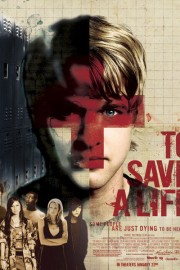To Save a Life
Here’s a film that looks at faith and religious belief in a way that doesn’t preach, but looks to show people a practical application of such thought in everyday life. OK, there’s more than a little preachiness, but it gets more mileage than you might think.
The film starts out at Roger Dawson’s funeral. Roger (Robert Bailey Jr.) used to be best friends with high school basketball star Jake Taylor (Randy Wayne), but once popularity- and a potential cheerleader girlfriend in Amy (Deja Kreutzberg)- presented themselves, Jake tossed Roger aside as a friend. Three years later, Roger comes into school one day, and shoots some warning shots in the air before taking his own life. Despite their estrangement, Jake attends the funeral. He was also there when Roger shot himself.
The film follows Jake through an emotional journey of dealing with his friend’s death, and the personal transition he decides to make as a result of it. His parents are unhappy in their marriage, with his distant father being more concerned with his son watching out for himself so he can go to Louisville on scholarship than the excitement of how his son plays. But when a party is broken up by the cops, and Amy makes off with his truck, he has to call on youth pastor Chris Vaughn (Joshua Weigel), a decision that will change him, and force him to make some tough choices along the way.
Over the past several years, Christian-themed films have started to make some headway in the marketplace. More so than 1999’s surprise hit “The Omega Code” and the direct-to-video “Left Behind” films, recent successes like “Facing the Giants” and “Fireproof” (which were distributed by Samuel Goldwyn Company, who also released “To Save a Life”) have made religious-themed films a niche worth taking notice of. But this film feels more like “A Walk to Remember,” the 2002 Nicholas Sparks adaptation in which pop star Mandy Moore played a good Christian girl who turns the life around of a popular troublemaker (played by Shane West) with her honesty and certainty about herself. That film, a four-star tearjerker in every way, has nonetheless resonated over the years because of a warmth and truth that can’t be faked.
This is the type of film writer Jim Britts and director Brian Baugh (making his first film) is very much trying to make. And sometimes, I’ll admit that I was very much engaged in the film and its’ characters (including Kim Hidalgo as Andrea and Sean Michael as Jonny, who was friends with Roger). But then “the message” sets in (which, regardless of how important it is, feels forced), and the emotional lives of the characters feel more like melodrama and facile preaching than genuine experiences. The rough edges around the performances don’t help either. In the end, I couldn’t help but feel like the filmmakers, regardless of how noble their intentions were, were more interested in getting on the coattails of a recent trend then doing something from the heart.










